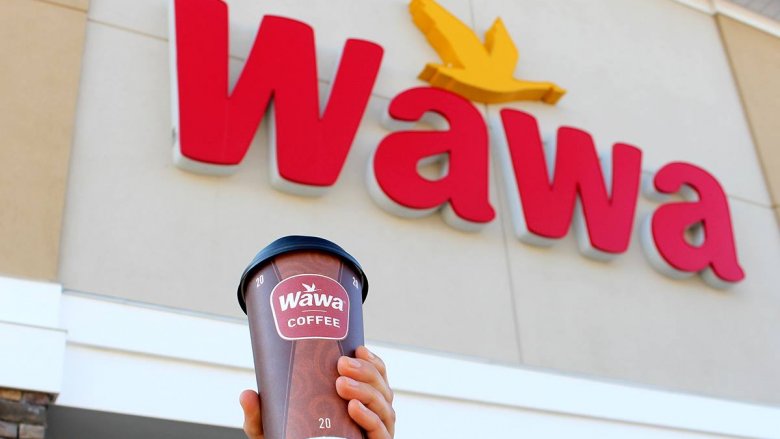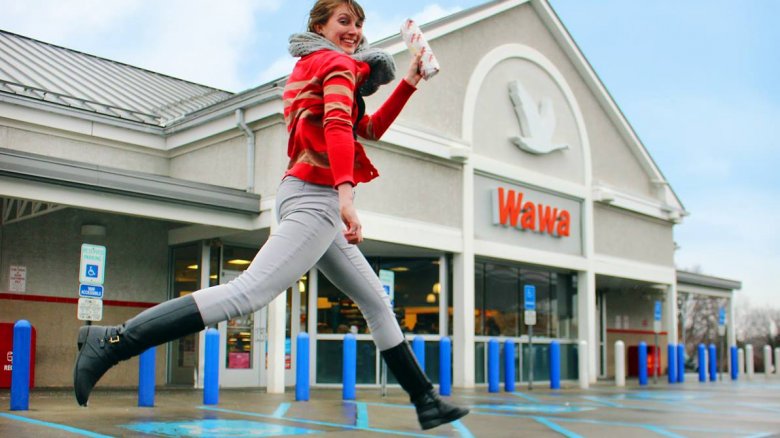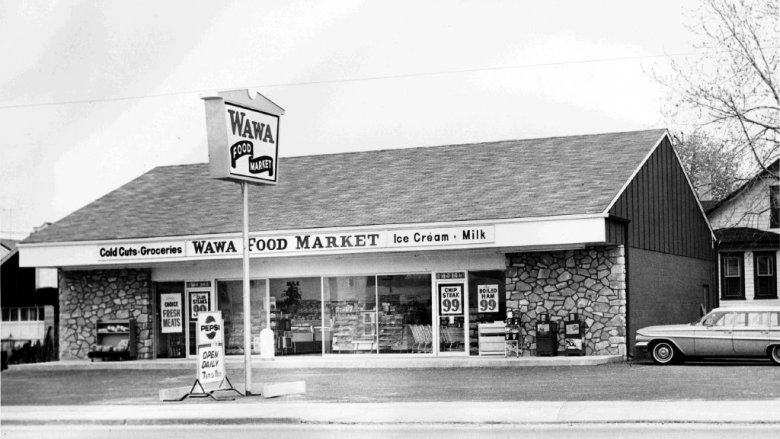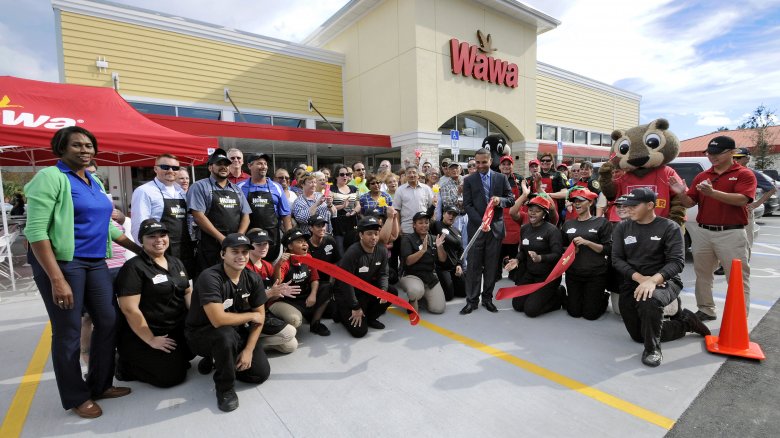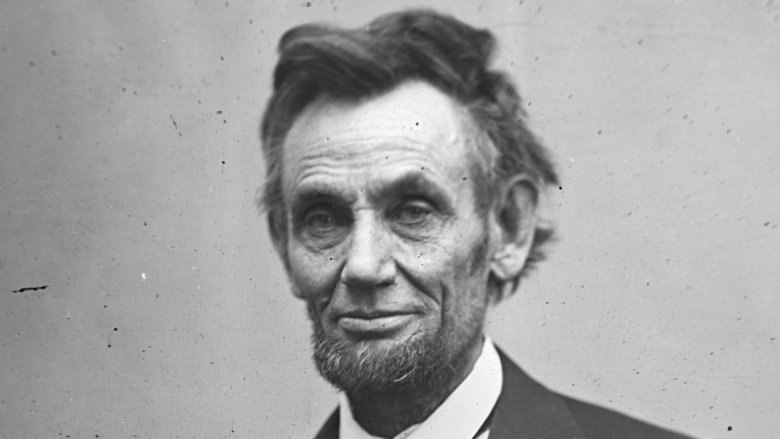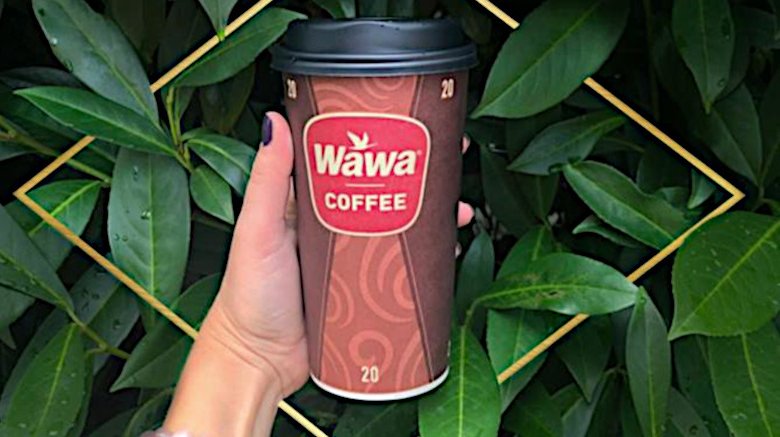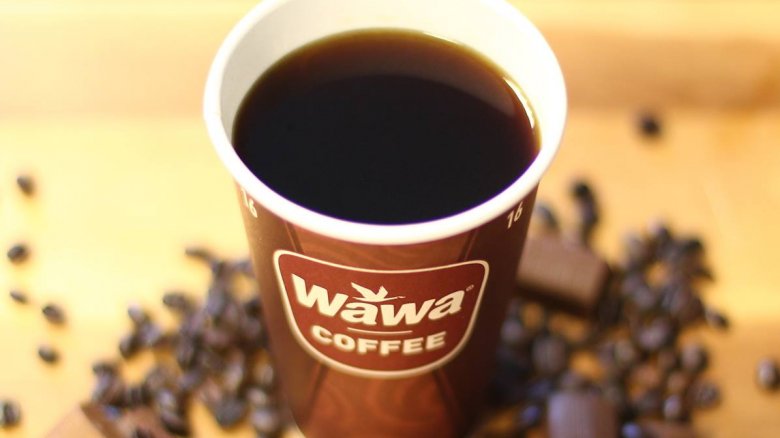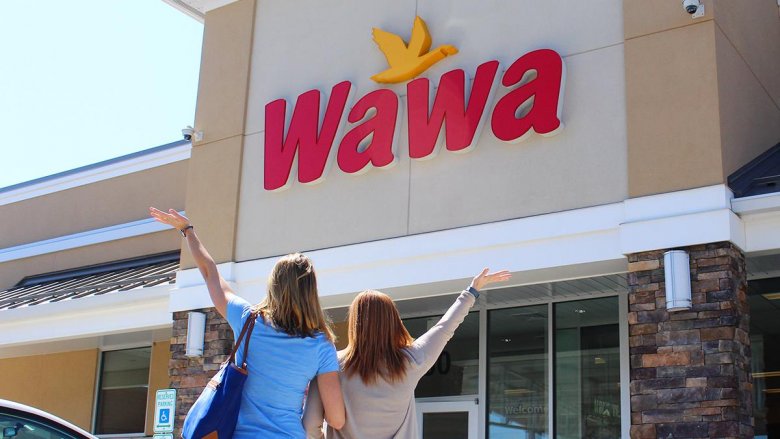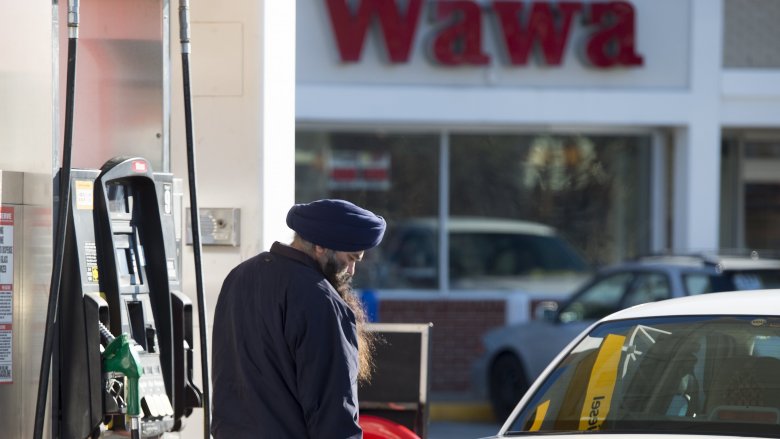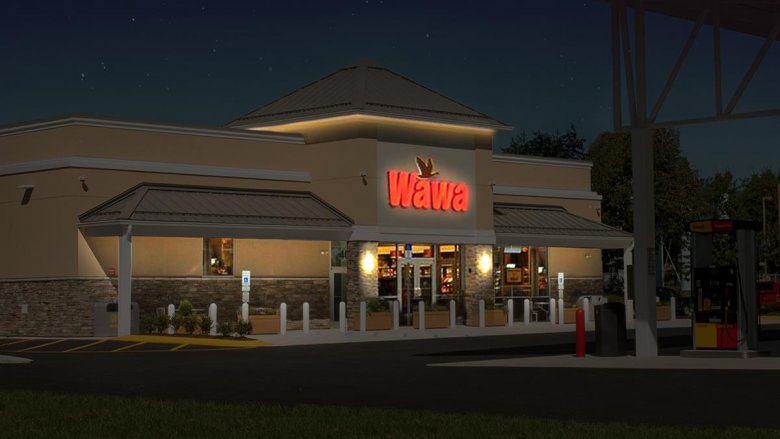The Untold Truth Of Wawa
For many Americans, Wawa is just the oddly named place where Barry hangs out with the JTP on The Goldbergs. But it's not a sitcom contrivance; the convenience store chain is very real, and almost universally beloved in its native Pennsylvania, as well as locations in New Jersey, Delaware, Maryland, Washington DC, and Florida.
In fact, if you're new to the region, one of the first things that you'll probably wind up doing is getting coffee and possibly one of their made-to-order hoagies, a pretzel sitting in its rack next to the Sizzi case, or a package of Tastykakes, Philadelphia's equally beloved snack-cake brand. How did this privately-owned convenience store chain, which still has its headquarters in the small town it was named after, become a beloved institution? It did it through a mix of hard work, obsessive quality control, and, in some cases, sheer ruthlessness on the part of the family that owns it.
Its fans are almost cult-like
There's no fan like a Wawa fan.
If, say, a 7-Eleven or a Tedeschi goes under, most people are more annoyed than anything else. When a Wawa closed at 20th and Locust in Philadelphia in 2008, there were protests complete with signs, chants, and a catchy slogan, "WawaTF?" Similarly, dead Wawas are often mourned on a scale rarely seen for any food shop, to the point where a fan tracks former stores on a blog called Waswas.
The New York Times once called Wawa's customer base a cult, and Mashable did the same, even interviewing a man who claimed not to care about Wawa, only to realize he visited at least four different Wawas a day. They have over one million fans on their Facebook page (which is huge, considering they have less than 1,000 stores), with an extremely active Community section. ABC News called their fanbase "fanatical."
It's even gotten loving tributes from comedians, notably the unbreakable Kimmy Schmidt herself, Ellie Kemper, in the Princeton Alumni Weekly.
So what's the big deal about Wawa? Some fans call the stores communities, and describe the employees as more like family. For others, it's just really good coffee — and even better hoagies.
Wawa has been around for centuries... kinda
Wawa didn't have anything to do with food, at first. It was started as an iron foundry in 1803, run by David Wood. George Wood, nephew of David, used money from the foundry to open the Wawa Dairy Farm in 1902. It rapidly took off, in part because Wood used a rigorous quality control process to ensure his milk was as clean as possible at a time where food quality was a gamble, especially for children.
As demand for milk exploded, Wawa became one of the most popular dairy delivery services in the wider Philadelphia area. However, as grocery stores appeared and milk shipping became cheaper and safer, the Wood family began to notice milk delivery was dropping in popularity.
So in 1964, it tried something new, opening a convenience store, Wawa Food Market, in Folsom, PA. Eight years later, there were 100 Wawas, and the store has been steadily growing since. There are about 800 Wawas today, and though they still process their own milk, they get that milk from local dairy farms, rather than their own.
There's a lot of family drama
An Inc. profile of Wawa that ran in June 2018 reveals that although the Wood family is still a presence in the company, the company's former CEO, Dick Wood, was adamant that the family didn't dominate the company. His son, Rich Wood, had to work his way from the bottom to convince his dad he deserved a role at the company.
The elder Wood was adamantly against taking the company public, and instead has steadily been transferring ownership to the company's 30,000 employees. The employee stock program started in 1992 and as of 2018, its own employees own 41 percent of the company.
It wasn't entirely altrustic though — Wood came up with the idea to prevent a hostile takeover by a trustee who wanted to force the company to go public. He bought out the trustee, and then sold his own family's stakes to the employees as a tricky way to keep the company private. It was a gesture both generous and ruthless in equal measure; really nobody came out the loser. But the real winner was decidedly the company's employees.
Abraham Lincoln was a debt collector for the family
Yes, Honest Abe, of all Presidents, has a connection to a convenience store chain, thanks to its deep family roots. Before the Gettysburg Address, the Civil War, and that unfortunate business at Ford's Theater, Abraham Lincoln was just a simple country lawyer trying to make ends meet, and that meant picking up jobs like debt collector. And since it was commonplace back in the day to just skip town if you racked up debt, especially since the United States didn't have a federal bankruptcy law until 1867, Lincoln was often hired by families such as the Woods of Philadelphia back in their iron-foundry days. Lincoln was hired to find would-be cheaters, and either get the money back or involve local law enforcement.
Surviving records don't tell us how good Lincoln was at the job, although considering his personal problems with money, and his later financial reforms, one suspects he was a bit more generous than his employers would have liked.
Wawa invests a lot in employees
It's not just the stock plan that makes Wawa stand out as one of the better places to work. The company has been acclaimed by the Harvard Business Review not just for investing in employee training, but for its Wawa University program that encourages employees to go to college by paying for their tuition at several universities. They do this with the belief that it helps the employee and it makes them better at their jobs. That employees stick around for decades tends to prove the point.
In fact, a lot of time and energy goes into making sure employees are happy. As the Harvard study noted, Wawa has low turnover relative to the industry, and since that 2005 profile, the company's invested a lot into holding on to their employees, to the point of defensive wage hikes to keep competitors from poaching their staff. They even use complicated software analytics to figure out what drives new employees to quit, so they can solve those problems before it gets that far.
Their coffee is all their own
Wawa is famous for its obsession with quality control, which started with the aforementioned dairy; its claims of cleanliness and high standards weren't just hype. Where this really stands out is Wawa's beloved, signature-branded coffee, which was first introduced in 1978.
Everything about this private label coffee, from the "brew island" where you pour the joe to the proprietary blend of beans that's a company secret, is carefully analyzed and tweaked to achieve maximum customer satisfaction and the best possible coffee. The results speak for itself, as Wawa moves about 195 million cups of coffee a year, and they sold their billionth cup of coffee way back in 2008. That makes them one of the biggest sellers of brewed coffee in the US.
They sell regular and decaf brews, as well as flavored coffees, lattes, and hand-pulled espressos — and you won't get them anywhere but Wawa. And now, they're upping their game even more with Wawa Reserve, small-batch, limited-edition coffees sourced from all over the world. Starbucks who?
It was using touchscreen ordering before it was cool
Touchscreen ordering is growing rapidly these, and there's been endless argument over whether this is good for employees, or whether it's the vanguard of the robot invasion. We can look to Wawa for the answer; they were way ahead of the curve when they introduced touchscreen ordering across their entire line of stores in 2002 — nearly a decade before they were popping up everywhere else. For years, Wawa customers have been able to order custom hoagies, drinks, and more — all with the touch of a screen. Wawa's touchscreens might be its most nationally famous feature, as they've been praised by Mitt Romney while on the campaign trail in 2012 and, depending on who you believe, stymied Fox News pundit Sean Hannity. It's not all touchscreen though — you only use the touchscreens to place orders, and leaving the store still involves talking to a cashier.
If you were wondering, the touchscreens haven't had any impact on Wawa's hiring, at least that the company has reported. It's been steadily adding employees as the company has grown, and just this year announced it needed to hire another 5,000 employees in the space of three months.
The new Wawa will be very different
Convenience stores are about, well, convenience, and despite the fact that Americans are smoking less and stressing about the environment, cigarettes are still big business in the convenience industry. And Wawa is, or rather was, no exception — to the point where they managed to make the city of Philadelphia tweak its tobacco laws concerning who could sell cigarettes. But according to Inc., Wawa is beginning to reconsider its bad habits: A newly opened "flagship" Wawa, in Philly's Center City neighborhood, won't be selling tobacco or gas at all, focusing on what the current CEO, Chris Gheysens, calls a "barbell" strategy: Keeping the gas and cigarettes around in suburban stores while steadily nudging into territory such as Tesla charging stations and small-batch coffee. "When a convenience store doesn't sell cigarettes and gas, that begins not to be a convenience store," he says. If these changes keep up, it's possible we won't even recognize the Wawas of the future.
The pretzels, however, will be sacrosanct, no matter how popular low-carb diets get, because there are some traditions you just don't mess with.
And it won't be coming to you
Despite the fact that a convenience store with great coffee and sandwiches made to order, that treats its employees well, would seem like a slam dunk across the entire country, Wawa is very careful how it expands. It was once in Connecticut and the New York City area, through franchisees, but quality began to slip and the stores were sold off. It only expanded into Florida once it was absolutely sure it could maintain the infrastructure in a set of stores hundreds of miles from the home office.
Wawa views itself in the same realm as In-N-Out and Wegmans, a regional staple that's slowly growing, and will only expand to places where it can keep its quality control in place and deliver the experience its fans yearn for. It also is constantly reinventing itself, trying new products and approaches to get the maximum out of its current stores without taking customers or employees for granted. But never say never; hey, the Eagles won the Super Bowl, so anything's possible.
In the meantime, if you're wondering just what you're missing, you can get Wawa coffee in K-cup or bagged form on their website.
